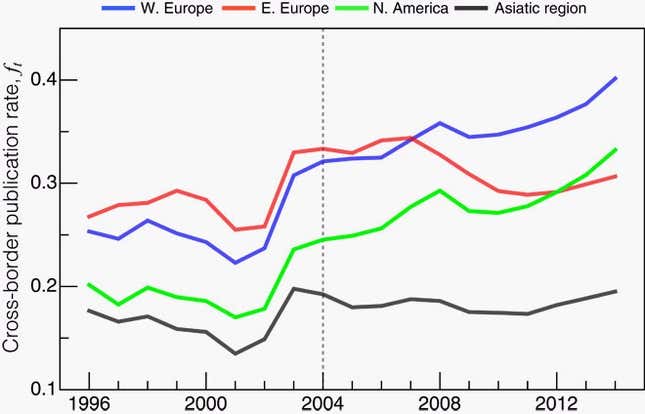In a single swoop in 2004, the EU added 10 new member states. The mostly Eastern European countries were considerably poorer than the old guard. But the hope was that the EU’s founding ideals of increasing prosperity among all its members would help them become more equal sooner.
Scientific research has been shown to be a key part of any economic transformation. The hope was that the freedom of movement across borders would enable scientists from the former Soviet Bloc to increase their collaboration with those in scientifically advanced Western European countries. If, say, a Polish researcher moved to the UK, she would begin new collaborations with UK researchers but also enhance the collaborations she already had with her home country.
The exact opposite happened. Instead of increasing, a new analysis has found that the rate of cross-border collaborations with Eastern European scientists dropped after 2004 (see red line in chart).

“I’m quite surprised how big the effect is,” Paul Nightingale, a science policy expert at the University of Sussex, told Science. “These are worrying findings.”
To come to this conclusion, researchers counted the number of studies with international co-authors from each of the member states. So if a paper had authors only from one country, then it wasn’t counted. Based on this measure, they found that, for example, the percentage of internationally co-authored studies from Poland fell from 33% in 2004 to 28% in 2011. But in the UK, the percentage of internationally co-authored studies rose from 28% in 2004 to 43% in 2011. Instead of bringing more scientific collaboration to Poland and thus raising economic potential in the country, EU membership reduced the percentage of international collaborations for Poland.
This makes sense once one considers that nature of scientific research. The best scientists already have international collaborations regardless of border controls, and when those controls are lifted, they relocate to the best research centers. When a high-standing Polish researcher moves to the UK, she takes the collaborations she has with researchers in Germany and France with her. After the move, her research papers would appear only in the UK database but not in the Polish one. Her research and scientific connections leave Poland with her.
Specialization within EU countries is inevitable. The UK attracts the best talent in finance (or, it did, until Brexit happened), and Germany is often at the center of the most advanced manufacturing companies. “Scientists gravitate to the places where they can do the best science,” Peter Tindemans, secretary-general of EuroScience, a membership association of European researchers, told Science.
This is a tricky situation for policymakers, especially when scientific research is a largely state-funded enterprise. On the one hand, they don’t want to impede the best science from happening or the free flow of scientists across borders. On the other hand, the region that loses scientists has been shown to have poorer economic outcomes.
If there is a solution to the problem, it is to invest in a way that encourages scientists to move to gain skills but then move back to enhance their home country. Another is to invest in centers of excellence in countries that need a science boost.
The EU is trying both tacks, but there’s a limit to how much it can achieve. “It’s impossible that you will have the same high-quality research universities all over Europe,” Tindemans told Science. “There are too few people and not enough money.”
